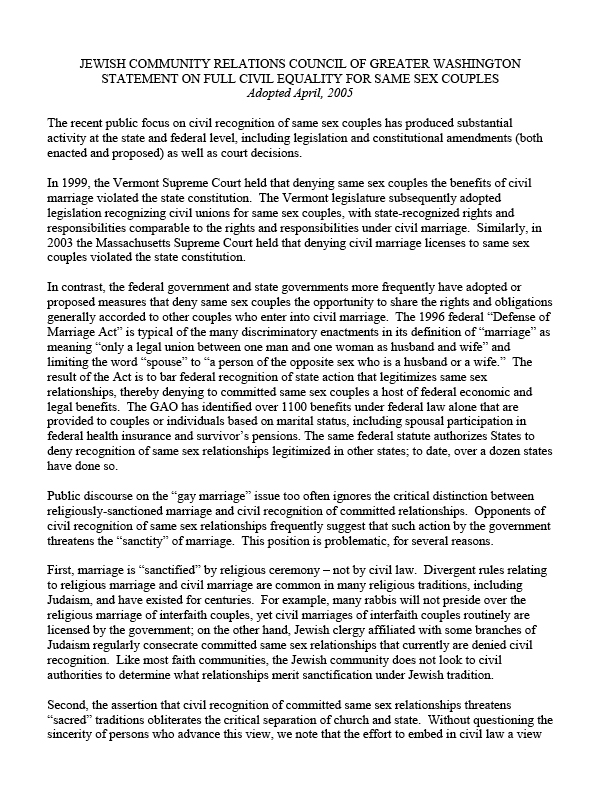Policy Resolution
April 1, 2005
Jewish Community Relations Council of Greater Washington Statement on Full Civil Equality for Same Sex Couples
The recent public focus on civil recognition of same sex couples has produced substantial activity at the state and federal level, including legislation and constitutional amendments (both enacted and proposed) as well as court decisions.
In 1999, the Vermont Supreme Court held that denying same sex couples the benefits of civil marriage violated the state constitution. The Vermont legislature subsequently adopted legislation recognizing civil unions for same sex couples, with state-recognized rights and responsibilities comparable to the rights and responsibilities under civil marriage. Similarly, in 2003 the Massachusetts Supreme Court held that denying civil marriage licenses to same sex couples violated the state constitution.
In contrast, the federal government and state governments more frequently have adopted or proposed measures that deny same sex couples the opportunity to share the rights and obligations generally accorded to other couples who enter into civil marriage. The 1996 federal “Defense of Marriage Act” is typical of the many discriminatory enactments in its definition of “marriage” as meaning “only a legal union between one man and one woman as husband and wife” and limiting the word “spouse” to “a person of the opposite sex who is a husband or a wife.” The result of the Act is to bar federal recognition of state action that legitimizes same sex relationships, thereby denying to committed same sex couples a host of federal economic and legal benefits. The GAO has identified over 1100 benefits under federal law alone that are provided to couples or individuals based on marital status, including spousal participation in federal health insurance and survivor’s pensions. The same federal statute authorizes States to deny recognition of same sex relationships legitimized in other states; to date, over a dozen states have done so.
Public discourse on the “gay marriage” issue too often ignores the critical distinction between religiously-sanctioned marriage and civil recognition of committed relationships. Opponents of civil recognition of same sex relationships frequently suggest that such action by the government threatens the “sanctity” of marriage. This position is problematic, for several reasons.
First, marriage is “sanctified” by religious ceremony – not by civil law. Divergent rules relating to religious marriage and civil marriage are common in many religious traditions, including Judaism, and have existed for centuries. For example, many rabbis will not preside over the religious marriage of interfaith couples, yet civil marriages of interfaith couples routinely are licensed by the government; on the other hand, Jewish clergy affiliated with some branches of Judaism regularly consecrate committed same sex relationships that currently are denied civil recognition. Like most faith communities, the Jewish community does not look to civil authorities to determine what relationships merit sanctification under Jewish tradition.
Second, the assertion that civil recognition of committed same sex relationships threatens “sacred” traditions obliterates the critical separation of church and state. Without questioning the sincerity of persons who advance this view, we note that the effort to embed in civil law a view that is based solely on religious beliefs, and not on public policy, necessarily constitutes an effort to impose religious views on the general population and raises the most serious of First Amendment concerns.
Third, we recognize that while many roots of civil marriage can be traced to religious marriage, the institution of modern civil marriage has evolved largely to effectuate secular, and not uniquely religious, aims. By seeking civil recognition of their marriage, committed couples enter into a contract by which they mutually assume a new relationship toward each other and the state. The legal, financial and social benefits of marriage are large, just as marriage imposes weighty legal, financial and social obligations. These benefits and obligations – specified by state and federal law – advance a variety of important public aims.
The JCRC of Greater Washington strongly affirms the right of faith communities to prescribe their own standards for recognizing religious marriage. However, civil recognition of committed relationships is different from the sanctification of religious marriage. Committed same sex relationships promote family and social stability, and are no less deserving of full recognition under civil law than the committed relationship of a man and woman. The JCRC of Greater Washington therefore supports the full civil recognition of same sex relationships at all levels of government.
THEREFORE, BE IT RESOLVED:
- The Jewish Community Relations Council of Greater Washington affirms its opposition to discrimination against persons based on sexual orientation.
- The Jewish Community Relations Council of Greater Washington expresses its support for government action that provides civil status to committed same sex couples and their families equal to the civil status provided to the committed relationships of men and women and their families, with all associated legal rights and obligations, both federal and state.
- The Jewish Community Relations Council of Greater Washington opposes efforts at the federal and state level (whether through legislation or constitutional amendment) that would limit or deny legal benefits to same sex couples and their families.
Adopted April, 2005
Amended: By a vote of 5-1-2 the Executive Committee of the JCRC voted to clarify that this policy does provide for the endorsement of equal civil marriage initiatives, whether through the legislature or the courts. January 16, 2008
Document
